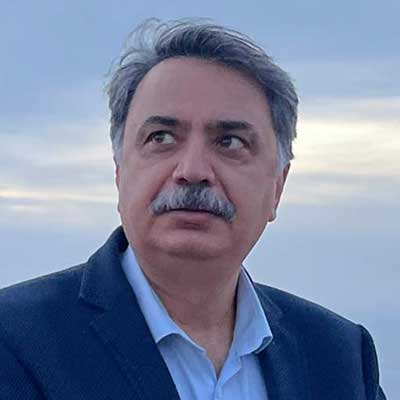Kirkuk's Post Elections' Political Future
Opinions 10:30 AM - 2024-01-02 PUKMEDIA
PUKMEDIA
Dr. Yousif Goran.
Written by Dr. Yousif Goran, Supervisor of the PUK's Research Center
If Iraq has officially existed since 1921, then Kirkuk, as part of Mosul province, officially became part of the new Iraqi state five years later (ie, in 1926). The delay in the inclusion of Kirkuk and the entire province of Mosul into the new Iraqi state was not solely caused by the conflict between Britain and Türkiye, but also by the distinct demographics of Mosul province (which includes Kirkuk). According to the most recent report from the League of Nations Fact-Finding Committee, the Kurds constitute the majority, comprising two-thirds of the population, alongside the Turkmen and Arabs. This different reality of Kirkuk has thus far had an impact on the political landscape and the city's future prospects.
Despite being the largest ethnic group in Kirkuk province, as indicated by elections' statistical data and votes, it is widely known that the Kurds have been entirely excluded from positions of authority in the city since October 16. Nevertheless, during the provincial council elections in 2023, the Kurds emerged victorious once more, garnering the greatest number of votes and seats in comparison to other ethnic groups. The depicted illustration unequivocally demonstrates that the Kurdish position in the governance of both the city and the province is of utmost significance and cannot be disregarded in any democratic undertaking. Regardless of experiencing fragmentation and a decrease in votes owing to running different lists, the Kurds managed to enhance their position in the city's provincial council. Undoubtedly, this will directly influence the standing of the administration in the city.
The current situation in Kirkuk is very fragmented and sensitive. Despite the presence of three main ethnic groups (Kurds, Turkmen, and Arab) and a Christian minority, the ethnic groups themselves form different lists. The process of forming the local government in Kirkuk is likely to become very complicated and will not pass without compromise for each other and the consent and partnership of all ethnic groups and communities. We also cannot ignore external and regional forces' role in the stability and future of Kirkuk.
Thus, after more than six years of neglect and marginalization of the Kurds in this city, after the recent elections, we have learned several facts:
First, it is impossible for a single community to effectively govern this diverse and multicultural city. Exerting the dominance and authority of a single community over others would inevitably lead to unrest and subsequent political and security instability.
Second, creating a distinct illustration of authentic ethnic and community collaboration in Kirkuk holds significant importance. This example should be mirrored across all levels of authority and among all communities. The fundamental tenets of this paradigm are around the harmonious coexistence of communities and the equitable distribution of positions, wealth, and services.
Third, military and security approach is incapable of resolving the issues in Kirkuk. It is imperative for all individuals living in the province to collectively engage and act as authentic collaborators in the management of many matters, including security concerns.
Fourth, the policy of eradicating the presence of others, whether by means of Arabization and seizure of lands belonging to Kurds and Turkmen, or by removing them from positions of power, is ineffective and incapable of establishing lasting social, political, and security stability. It is therefore best for all parties involved to cease this policy and acknowledge the multicultural and diverse nature of the city.
Kirkuk has the potential to transform from a source of conflict between Iraqi nations and regional tensions into a symbol of peaceful coexistence and democratic unity among Iraqi nations. It might serve as a platform for the convergence of diverse interests.
Due to their influential post-election position, the Kurds have the capacity to propose an initiative that can lead to a more secure and promising future for all communities. However, the success of this proposal hinges on the political determination of all other parties and communities, and it must be promptly endorsed and put into action.
More news
-
European Parliament Member Calls for Continued Humanitarian Aid to Rojava
01:55 PM - 2026-02-21 -
CDO, Sulaymaniyah University Delegation Conclude Field Visit to Historic Shu’aibiya Monument in Basra
11:53 AM - 2026-02-21 -
North Oil Company Says Kirkuk Gas Compression Station Fire Under Control
10:26 AM - 2026-02-21 -
U.S. President to Visit China Amid Supreme Court Tariff Ruling
09:31 AM - 2026-02-21
see more

P.U.K 01:32 PM - 2026-02-21 PUK President: We Promise to Work to Strengthen the Kurdish Language in Every Sphere
Deputy PM: Our Mission has Shifted from Preserving Kurdish Language to Developing It
11:28 AM - 2026-02-21
International Mother Language Day Highlights Urgent Need to Protect Linguistic Diversity
09:56 AM - 2026-02-21
Fahmi Burhan: District Status Change of Jalawla Is Unconstitutional
10:34 PM - 2026-02-20
PUK's Saadi Ahmed Pire Meets Swedish Left Party Delegation in Erbil
08:02 PM - 2026-02-20
Most read
-
The Battle for the Mind: Cultural Independence in a Changing Middle East
Opinions 12:10 PM - 2026-02-20 -
Kremlin Says Russia–Japan Relations “Reduced to Zero” Amid Territorial Dispute
World 02:05 PM - 2026-02-20 -
Only One Bakery Can Operate As Kobani Siege Continues
Kurdistan 05:05 PM - 2026-02-20 -
U.S. President Directs Government to Prepare Release of Aliens and UFOs Files
World 12:20 PM - 2026-02-20 -
PUK's Saadi Ahmed Pire Meets Swedish Left Party Delegation in Erbil
P.U.K 08:02 PM - 2026-02-20 -
Fahmi Burhan: District Status Change of Jalawla Is Unconstitutional
Kurdistan 10:34 PM - 2026-02-20 -
U.S. President to Visit China Amid Supreme Court Tariff Ruling
World 09:31 AM - 2026-02-21 -
UK Foreign Secretary to Meet Rubio Amid Renewed U.S. Criticism Over Chagos Deal
World 05:42 PM - 2026-02-20





.jpg)
 Application
Application


